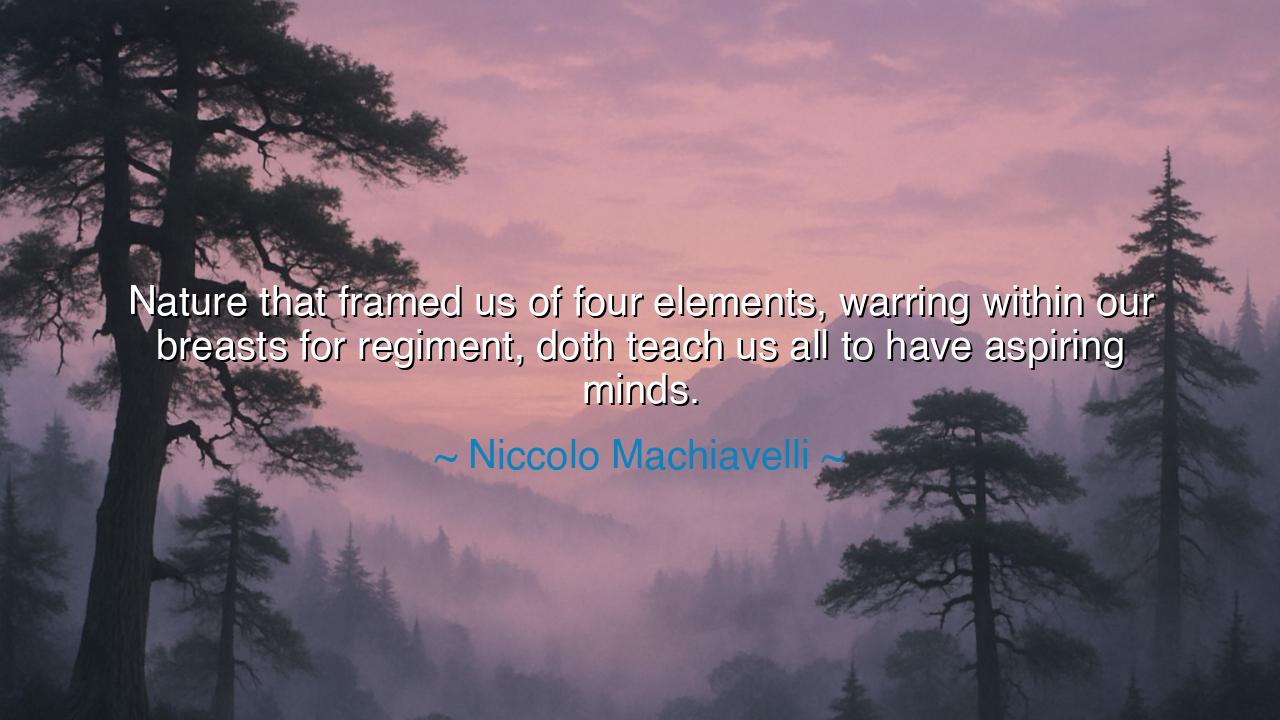
Nature that framed us of four elements, warring within our
Nature that framed us of four elements, warring within our breasts for regiment, doth teach us all to have aspiring minds.






The words of Machiavelli, “Nature that framed us of four elements, warring within our breasts for regiment, doth teach us all to have aspiring minds,” echo like thunder from the mountains of antiquity. He calls upon the four elements—earth, air, fire, and water—not merely as substances of the body, but as living forces within the soul. They clash, they contend, they wrestle for mastery. This inward strife is not a curse but a summons: from conflict rises strength, and from strength is born the desire to aspire. Just as the world is forged by the storm and the flame, so too is man driven upward by the unrest within his breast.
The ancients saw in the elements not just matter but spirit. Earth steadies us, yet makes us cling to the soil; water nourishes but may drown us in comfort; air lifts the spirit toward freedom, yet may scatter us like dust; fire kindles passion, but may consume in destruction. To live is to endure their struggle within. And it is this eternal war within, this ceaseless balancing of forces, that gives us ambition. Without resistance, man would be like stagnant water; without strife, like dull stone. Thus, Nature herself has written upon our souls the law of aspiration.
Consider Alexander of Macedon, who stood at the edge of the known world. Was it peace in his breast that carried him there? No—within him burned the fire of conquest, tempered by the air of vision, grounded by the earth of discipline, and cooled by the waters of strategy. His inner elements did not rest; they warred ceaselessly. And that very warfare of the soul propelled him to deeds so vast that centuries still whisper his name. He was no stranger to turmoil, yet he learned to marshal those inner forces and command them, as he commanded armies.
Yet let us not believe that such teaching belongs only to kings and conquerors. A simple man, tilling his land, feels it too: the urge to sow more than he did last year, the yearning to see his children rise higher than himself, the thirst to carve his mark, however small, upon the earth. Even the humblest heart, struck by hunger or by love, feels the cry of the elements—do not remain as you are, but strive, ascend, become more.
But heed this wisdom, children of the future: the aspiring mind is both gift and burden. If left untended, it becomes pride, which devours its bearer. If denied, it becomes despair, which breaks the spirit. The lesson of Machiavelli is not that we should silence the elements within, but that we must learn to give them regiment—order, discipline, harmony. Just as a general arrays his troops, so must the wise soul order the fire of passion, the weight of earth, the flow of water, the breath of air.
From this truth arises a path of action. When you feel within yourself the storm of conflicting desires—anger clashing with patience, fear with courage, ambition with doubt—do not shrink from it. Instead, pause and govern. Ask: which element must rule in this hour? Sometimes fire must lead, sometimes earth must hold firm. Do not let the strongest passion seize the throne; let the right passion reign. In this way the war within becomes not chaos but power.
The practical lesson is clear: discipline your inner nature. Begin each day with reflection: what do you seek, and which force in you will carry you toward it? Train your body with toil, your mind with study, your spirit with silence. When ambition rises, test it against justice; when fear rises, temper it with reason. Thus will you fulfill the teaching of Nature and the counsel of Machiavelli: to harness the strife within and shape it into greatness.
Therefore, take courage, children of the fourfold flame. The very conflict you feel is proof of your destiny. The gods did not make you for stillness, but for striving. Accept the war in your breast as the forge of your soul. Turn its fire into light, its storm into motion, its weight into foundation, its flow into renewal. Then you shall know what it is to live not as clay, but as a being of aspiration, ever rising, ever becoming. For the elements contend within you, that you may contend with the world.






AAdministratorAdministrator
Welcome, honored guests. Please leave a comment, we will respond soon